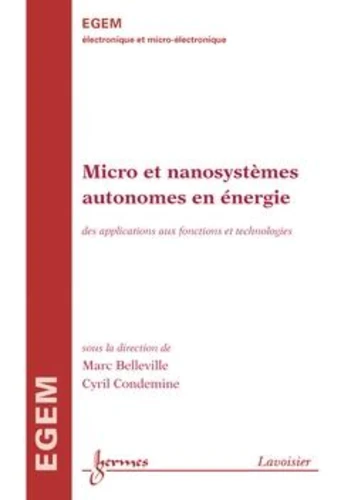Micro et nanosystèmes autonomes en énergie. Des applications aux fonctions et technologies
Par : ,Formats :
Actuellement indisponible
Cet article est actuellement indisponible, il ne peut pas être commandé sur notre site pour le moment. Nous vous invitons à vous inscrire à l'alerte disponibilité, vous recevrez un e-mail dès que cet ouvrage sera à nouveau disponible.
Disponible dans votre compte client Decitre ou Furet du Nord dès validation de votre commande. Le format PDF est :
- Compatible avec une lecture sur My Vivlio (smartphone, tablette, ordinateur)
- Compatible avec une lecture sur liseuses Vivlio
- Pour les liseuses autres que Vivlio, vous devez utiliser le logiciel Adobe Digital Edition. Non compatible avec la lecture sur les liseuses Kindle, Remarkable et Sony
 , qui est-ce ?
, qui est-ce ?Notre partenaire de plateforme de lecture numérique où vous retrouverez l'ensemble de vos ebooks gratuitement
Pour en savoir plus sur nos ebooks, consultez notre aide en ligne ici
- Nombre de pages391
- FormatPDF
- ISBN978-2-7462-7517-1
- EAN9782746275171
- Date de parution11/07/2012
- Copier Coller01 page(s) autorisée(s)
- Protection num.Digital Watermarking
- Taille10 Mo
- Transferts max.Autorisé
- Infos supplémentairesPDF avec Watermark
- ÉditeurHermes Science Publications
Résumé
Cet ouvrage propose un panorama détaillé des micro et nanosystèmes autonomes en énergie, couvrant à la fois les principes mis en oeuvre et les derniers développements. Une étude approfondie d'applications dans les domaines aéronautiques, médicaux et du contrôle des bâtiments permet de dresser les grandes spécifications de tels systèmes et de leurs sous-composants. Les techniques les plus récentes de récupération et conversion d'énergie d'origine photovoltaïque, thermique et mécanique sont présentées.
Un état de l'art sur les interfaces capteurs, le traitement du signal numérique et les liaisons radiofréquence, ultra-basse consommation, complète ce panorama. Enfin, des techniques d'optimisation de l'énergie au niveau du microsystème/noeud de capteur et d'un réseau de capteurs sont introduites et discutées.
Un état de l'art sur les interfaces capteurs, le traitement du signal numérique et les liaisons radiofréquence, ultra-basse consommation, complète ce panorama. Enfin, des techniques d'optimisation de l'énergie au niveau du microsystème/noeud de capteur et d'un réseau de capteurs sont introduites et discutées.
Cet ouvrage propose un panorama détaillé des micro et nanosystèmes autonomes en énergie, couvrant à la fois les principes mis en oeuvre et les derniers développements. Une étude approfondie d'applications dans les domaines aéronautiques, médicaux et du contrôle des bâtiments permet de dresser les grandes spécifications de tels systèmes et de leurs sous-composants. Les techniques les plus récentes de récupération et conversion d'énergie d'origine photovoltaïque, thermique et mécanique sont présentées.
Un état de l'art sur les interfaces capteurs, le traitement du signal numérique et les liaisons radiofréquence, ultra-basse consommation, complète ce panorama. Enfin, des techniques d'optimisation de l'énergie au niveau du microsystème/noeud de capteur et d'un réseau de capteurs sont introduites et discutées.
Un état de l'art sur les interfaces capteurs, le traitement du signal numérique et les liaisons radiofréquence, ultra-basse consommation, complète ce panorama. Enfin, des techniques d'optimisation de l'énergie au niveau du microsystème/noeud de capteur et d'un réseau de capteurs sont introduites et discutées.




